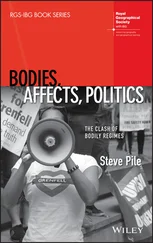Mayya sighed and looked closely at her tiny daughter’s black hair which had slowly begun to grow. Her gaze settled on the baby’s forehead, slightly more wrinkled than it should be, she thought. She asked herself whether it was true that a person’s fate was written on their brow, as people always said. What was written on the tiny forehead of this new little creature?
How could Mayya have seen, on her baby daughter’s brow, the evenings of sleeplessness that would come as she reached her early twenties, all of those nights to come when Ahmad’s face visited London insistently before his features faded so completely that she began doubting he was a real person with whom she had had a real relationship, that they had actually met, then also that they had really and truly broken up. London would try to hold his image in her mind but at the same time to banish it. It was usually just before dawn that her memory would bring up a certain image, always the same one, the portrait published in the university magazine. She saw something in that image that she hadn’t noticed in person. In the photo, his eyes shifted away from the camera. Eventually London had understood that look as one she could not trust.
Mayya stroked her daughter’s forehead and touched her wiry hair. Early in the morning Abdallah came in to see her, bringing cases of baby food in little jars. Mayya found this unnecessary and slightly disgraceful, but she didn’t say anything. First of all, this brand-new baby girl wouldn’t eat actual food for at least three months. Second, it wasn’t as if she, Mayya, was incapable of cooking for her daughter and had to have him bring her jars of Heinz and Milupa which had been canned only God knew when. No one in al-Awafi fed their babies such things. If he thought she was going to imitate his uncle’s wife in Maskad he was wrong. Mayya did not speak much but she would not imitate anyone. She would cook, herself, for her daughter. She would sew her daughter colourful frocks that no one had seen the like of on a little girl before. This girl would never leave the house without her hair combed and shoes on her feet and a frock with long bold stripes down the middle. Mayya would really prove now how truly skilled she was at sewing. London’s clothes would not look like anyone else’s just as her name echoed no other girl’s.
On the day we moved to the new house I saw my mother in a dream. I saw her wrapped in a long, loose-fitting white garment, walking over the water. I was walking behind her and calling out. Mama, Mama! But she did not turn around for me and I did not see her face until I woke up. I wish cameras had reached al-Awafi before she died. Zarifa always told me that I looked like her, though my paternal aunt was constantly insisting that I looked like my father.
The day London got the divorce she asked Ahmad for, and we returned the dowry, I saw my mother in a dream again. I saw her walking calmly ahead of me. I was gripping the hem of her veil and saying, Mama, why did you pull up the basil shrub? But she did not turn around for me. I didn’t hear her voice.
When I learned that Zarifa had died I saw my father first in a dream and then I saw her, tall and thin. She hugged me tightly. I was very short, barely reaching her middle, and she bent over me. Her hug was Mayya’s and her face was Zarifa’s.
As usual I found Mayya asleep. When we all stay up talking in the evening, she leaves to go to sleep as soon as my conversations with London or with Salim grow tense. When I come home from work in the late afternoon more often than not I find Mayya asleep.
Way back when I was a boy, if I ever dozed in the late afternoon Zarifa would fume. She would shout at me. The proverb-maker says: Quarrel with your neighbour if you must to make your mark, but never ever nap before dark! Mayya never formed the kind of serious bonds with neighbours that one would have to have even to quarrel, and she would drop off to sleep whenever she chose.
In the first years of our marriage she always woke up early and almost never took afternoon naps. After Muhammad was born, you could measure her sleep with his years. At first she would go to sleep beside him in that narrow little bed of his; even later on, once he had gotten older and his body filled the bed, she would lay down with him though then she would leave him on his own. Many times, when I came home in the evening I found them lying together on the bed, gazing at the ceiling where the electric fan spun. Muhammad was completely fixed on watching the fan move. If it stopped he would start crying, and he wouldn’t stop. So of course we kept the fan turning no matter what the temperature was. Mayya stayed in bed lying at his side for hours on end until he dropped off to sleep and she could leave him, to sleep herself.
Salima spoke to her daughters about it. Asma, Khawla, look here! She told them that Emigrant Issa’s two sons, who were in town now, had asked for the two of them. Khalid and Ali wanted to marry the sisters. She and their father Azzan could find no reason to turn them down, she informed them.
Asma was unruffled. She would think about it, she told her mother coolly. But she instructed her parents not to respond before she informed them of her own decision.
But Khawla, listening to her mother and sister, dropped her jaw, unable to hide her astonishment. When they were finally silent, she began saying no , faintly at first but then fiercely. No, no, no, no. They had never seen Khawla like this, never seen this semi-hysterical edge to her personality. She ran toward the girls’ room at the other end of the courtyard and shut the door behind her. She refused to open up to anyone before her father’s return. She would talk to him herself.
Asma continued as usual, helping her mother in the kitchen and in all the duties of the household, making coffee every morning and in the late afternoon for the women who were always visiting, dandling her sister’s nursing baby, discussing books with Mayya, listening to the radio, reading, and washing clothes for her father, for her sister just out of childbirth, and for the baby, the constant nappies of the newborn girl. But not for a moment could she stop thinking about this engagement. A few days later she said to her mother, just offhand as she was pounding cardamom seeds for coffee, Mama, okay, fine, I will accept this Khalid boy.
As she spoke, Azzan was hurrying home. He had returned unusually late from the Bedouin settlement. The cold wind slapped at his clothes. The recent events in his life had tugged him hither and yon, until he no longer knew where he was. Insinuations and sly suggestions seemed to meet him at every turn. The day before, swapping instantly-composed lines of poetry in playful competition with his daughter as they often did, Asma had disobeyed the rules of the game. He had declaimed
The beloved’s face gives yours more beauty
The more you give it your gaze
Asma shot back two separate lines in response, openings to famous poems by the ancient poet al-Samau’al and the ‘Abbasid poet al-Buhturi, but neither was composed on the same rhyme scheme, as they should have been, in the spirit of the game.
If a person’s honour is not sullied by base acts
then every garment he dons is beauteous
and then
I guarded myself from what would soil my self
and held myself above the paltry offerings of the scoundrel
So were people sensing Qamar’s presence in him? This beautiful Moon, Najiya? This wondrous Qamar had taught him his own body, as though he’d been completely clueless about it always before. This Qamar had taught him enticements that shattered his old existence to pieces. The way he felt about it, he hadn’t known anything at all about anything before he knew her. Every evening when his feet sank into the sand as he hurried toward the fragrance of her, whether he wanted it or not his whole being was driving him to this presence that was so extraordinary and had transformed his life. Coming to meet her like this simply intensified his thirst.
Читать дальше












